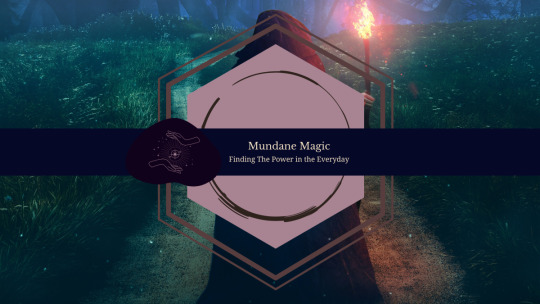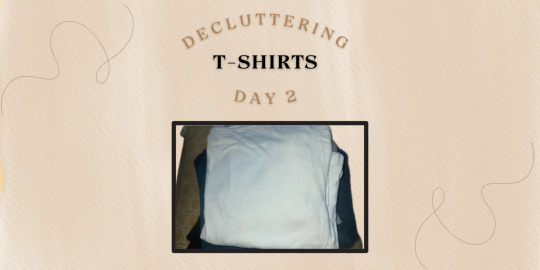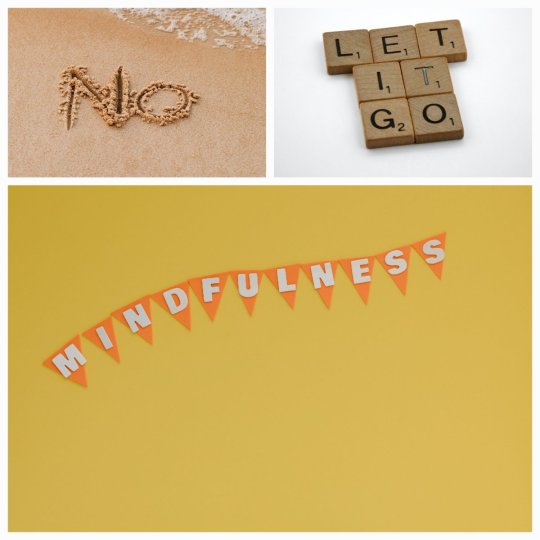#simplify your life
Text

#Orthodox Christian#saints#St. Paisios#Tips for contemporary man#trust completely in God#prayer#peace#humility#keep your mind near God#practice the presence of God#Read#simplify your life#everything is for our salvation#be thankful in testings
48 notes
·
View notes
Text
Hi! If you see this post, I want you to go to your email inbox and unsubscribe from at least 2 businesses whose emails you regularly ignore or delete without even reading them 💚
(And then reblog this so someone else will too!)
20 notes
·
View notes
Text
Lost in Zen: Navigating the Path to Inner Peace
Introduction
In today's fast-paced world, where chaos and distractions seem to be the norm, finding inner peace has become a coveted goal for many. The journey to inner peace often leads individuals to explore various practices and philosophies. One such path is the practice of Zen Buddhism, which offers a unique and profound way to navigate the complexities of life while seeking tranquility. In this blog, we'll delve into the concept of being "Lost in Zen" and how it can guide us towards a more peaceful existence.
Understanding Zen
Zen is a branch of Mahayana Buddhism that originated in China and later spread to Japan, where it became most prominent. At its core, Zen is about direct experience and intuitive understanding rather than relying on conventional knowledge or intellectual concepts. It emphasizes the importance of meditation, mindfulness, and living in the present moment to achieve enlightenment or "Satori."
The Paradox of Being Lost in Zen
Being "Lost in Zen" might initially sound counterintuitive. After all, we often associate being lost with confusion and disorientation. However, in the context of Zen, it means letting go of the mental clutter and distractions that keep us disconnected from our true selves and the present moment. Zen encourages us to lose ourselves in the moment, shedding the ego, and experiencing reality as it is, unfiltered.
Key Principles of Zen
Mindfulness: Zen teaches us to cultivate mindfulness, the practice of paying full attention to the present moment without judgment. By doing so, we can break free from the constant mental chatter and worries that often plague our minds.
Meditation: Meditation is a cornerstone of Zen practice. Through meditation, we learn to quiet our minds and observe our thoughts and emotions without attachment. This leads to greater self-awareness and a deeper connection with our inner selves.
Simplicity: Zen advocates for a minimalist and simple lifestyle. By decluttering our physical space and simplifying our lives, we create a conducive environment for inner peace to flourish.
Non-attachment: Zen teaches us to let go of attachments to material possessions, desires, and even our own self-concept. By relinquishing our clinging nature, we free ourselves from suffering and experience greater equanimity.
Practical Steps to Get "Lost in Zen"
Start with meditation: Begin a regular meditation practice to quiet your mind and connect with your inner self. Even a few minutes each day can make a significant difference.
Embrace mindfulness: Practice mindfulness in your daily activities. Pay attention to your breath, the sensations in your body, and the sights and sounds around you as you go about your day.
Simplify your life: Declutter your living space and let go of unnecessary possessions. Simplifying your life can lead to greater mental clarity and a sense of liberation.
Let go of attachments: Reflect on your attachments and desires. Are there things or ideas you're clinging to that cause suffering? Practice letting go and accepting things as they are.
Seek guidance: Consider joining a Zen meditation group or seeking guidance from a Zen teacher. Learning from experienced practitioners can deepen your understanding and practice.
Conclusion
Being "Lost in Zen" isn't about losing your way in life; it's about losing the distractions and attachments that keep you from experiencing true peace and clarity. By embracing the principles of Zen—mindfulness, meditation, simplicity, and non-attachment—you can embark on a transformative journey toward inner peace. Remember, the path to Zen is a lifelong journey, and each step brings you closer to a more meaningful and tranquil existence in our hectic world.
#Zen Buddhism#Inner Peace#Meditation#Mindfulness#Zen Philosophy#Simplify Your Life#Non-Attachment#Finding Tranquility#Zen Meditation#Letting Go#Self-Awareness#Present Moment#Zen Practices#Minimalism#Zen Lifestyle#Zen Teacher#Mindful Living#Enlightenment#Satori#Zen Wisdom#today on tumblr
12 notes
·
View notes
Text
Are you chewing or swallowing something, right now?
If not, you should fix that. Immediately.
18 notes
·
View notes
Photo

5 notes
·
View notes
Text
Owning Your Own Power
When you reclaim your magic, doors open for you. But how do you reclaim your magic? What if you only have really mundane magic? What if you are not the chosen one?
Today let's talk about the importance of mundane magic.
Daily writing promptWho is the most confident person you know?View all responses
One of the most frequently used, and frequently maligned, literary devices found in the world of Fantasy is the protagonist with hidden gifts. It is not hard to see why; it is often handled as a way for the writer to escape a hole they cannot seem to otherwise find their way out of and is often treated as the…

View On WordPress
#Authentic Self#Conversations with my teenage self#dailyprompt#dailyprompt-1879#Finding yourself in your 30&039;s#How do I confront obstacles#How do I find myself in my 30&039;s#How do I increase my self-worth#Life change#Motivation#mundane magic#personal growth#self acceptance#Self acceptance journey#self discovery#simplify your life
0 notes
Text
Minimalism Challenge: Day 2
Hello, friends! Happy day two of our minimalism challenge! Today’s declutter agenda: t-shirts! These are possibly the easiest clothing item to find yourself holding onto for too long. Every school, every job, every town you’ve visited… they start to pile up! For example, when I was cleaning out my t-shirt drawers, I found a shirt from elementary school! I’ve linked the graphic I made right…

View On WordPress
#blog#blogger#decluttering#living simply#midwest#midwest blogging#simple living#simplify your life#slow living
0 notes
Photo

Family Room Game Room in Chicago
Game room - large contemporary open concept game room idea
0 notes
Photo

Modern Bedroom
Image of a medium-sized minimalist guest bedroom
0 notes
Photo

Open Family Room in Chicago
An illustration of a sizable, modern, open-concept game room
#this is you this is new#family room#simplify your life#home organization#wrapping center#hobby room#spare room ideas
0 notes
Text
The Art of Essentialism: Simplify Your Life and Achieve More
It’s effortless to get swept into the hustle and bustle of daily life in today’s fast-paced world. We’re constantly bombarded with information, tasks, and responsibilities, and it can be overwhelming trying to keep up. But what if there was a way to simplify your life and achieve more? That’s where the art of essentialism comes in.
Simplification is important in life because it can help reduce…

View On WordPress
0 notes
Text
i think one of the reasons i really like bernard and darla is because they met him at a time when he wasn't robin. to me, tim drake has always felt like an amalgamation of robin and tim. and he's good at it y'know? being tim drake and robin but when bernard and darla meet him at grieves he can't be robin. he has to just be tim drake. and he's obviously struggling but he tries for his father. and that's so interesting to me because who is tim drake without robin? he obviously doesn't know either. and we see him explore this in urban legends. he even asks himself in urban legends, "who am i if i'm not robin?" and i don't think it's too much of a surprise that at the end of urban legends, when he's figured out what he wants, he chooses the boy who only ever knew him as tim drake.
#isn't it fascinating???#tim drake who is always tim and a mask‚ and if he isn't robin‚ then he's drake or red robin or something else#and when then sits down‚ and takes a good look at himself and starts asking questions#who am i without the mask? what do i want in life? who is tim drake?#when he finally figures it out at the end of urb.leg and he realizes what he wants‚ he chooses the boy who only ever knew him as tim drake!#doesn't that make you want to start chewing on drywall????#doesn't that make you want to sit on your kitchen floor and start rocking yourself as you sob????#HE CHOOSES THE BOY WHOSE NEVER KNOWN HIM WITH THE MASK *wails*#also disclaimer i feel like i'm simplifying war games a little bit#and like i don't think he stopped being robin until like 2/3/4? months into the school year??#but like for the sake of the post you kmow what i mean#dc#bernard dowd#timber#tim drake#timbern
314 notes
·
View notes
Text
i’ve been thinking a lot about what is so unique and appealing about 80s robin jay’s moral standing that got completely lost in plot later on. and i think a huge part of it is that in a genre so focused on crime-fighting, his motivations and approach don’t focus on the category of crime at all. in fact, he doesn’t seem to believe in any moral dogma; and it’s not motivated by nihilism, but rather his open-heartedness and relational ethical outlook.
we first meet (post-crisis) jay when he is stealing. when confronted about his actions by bruce he’s confident that he didn’t do anything wrong – he’s not apologetic, he doesn’t seem to think that he has morally failed on any account. later on, when confronted by batman again, jay says that he’s no “crook.” at this point, the reader might assume that jay has no concept of wrong-doing, or that stealing is just not one of the deeds that he considers wrong-doing. yet, later on we see jay so intent on stopping ma gunn and her students, refusing to be implicit in their actions. there are, of course, lots of reasons for which we can assume he was against stealing in this specific instance (an authority figure being involved, the target, the motivations, the school itself being an abusive environment etc.), but what we gather is that jay has an extremely strong sense of justice and is committed to moral duty. that's all typical for characters in superhero comics, isn't it? however, what remains distinctive is that this moral duty is not dictated by any dogma – he trusts his moral instincts. this attitude – his distrust toward power structures, confidence in his moral compass, and situational approach, is something that is maintained throughout his robin run. it is also evident in how he evaluates other people – we never see him condemning his parents, for example, and that includes willis, who was a petty criminal. i think from there arises the potential for a rift between bruce and jay that could be, have jay lived, far more utilised in batman comics than it was within his short robin run.
after all, while bruce’s approach is often called a ‘philosophy of love and care,’ he doesn’t ascribe to the ethics of care [eoc] (as defined in modern scholarship btw) in the same way that jay does. ethics of care ‘deny that morality consists in obedience to a universal law’ and focus on the ideals of caring for other people and non-institutionalized justice. bruce, while obviously caring, is still bound by his belief in the legal system and deontological norms. he is benevolent, but he is also ultimately morally committed to the idea of a legal system and thus frames criminals as failing to meet these moral (legal-adjacent) standards (even when he recognizes it is a result of their circumstances). in other words, he might think that a criminal is a good person despite leading a life of crime. meanwhile, for jay there is no despite; jay doesn't think that engaging in crime says anything about a person's moral personality at all. morality, for him, is more of an emotional practice, grounded in empathy and the question of what he can do for people ‘here and now.’ he doesn’t ascribe to maxims nor utilitarian calculations. for jay, in morality, there’s no place for impartiality that bruce believes in; moral decisions are embedded within a net of interpersonal relationships and social structures that cannot be generalised like the law or even a “moral code” does it. it’s all about responsiveness.
to sum up, jay's moral compass is relative and passionate in a way that doesn't fit batman's philosophy. this is mostly because bruce wants to avoid the sort of arbitrariness that seems to guide eoc. also, both for vigilantism, and jay, eoc poses a challenge in the sense that it doesn't create a certain 'intellectualised' distance from both the victims and the perpetrators; there's no proximity in the judgment; it's emotional.
all of this is of course hardly relevant post-2004. there might be minimal space for accommodating some of it within the canon progression (for example, the fact that eoc typically emphasises the responsibility that comes with pre-existing familial relationships and allows for prioritizing them, as well as the flexibility regarding moral deliberations), but the utilitarian framework and the question of stopping the crime vs controlling the underworld is not something that can be easily reconciled with jay’s previous lack of interest in labeling crime.
#fyi i'm ignoring a single panel in which jay says 'evil wins. he chose the life of crime' because i think there's much more nuance to that#as in: choosing a life of crime to deliberately cause harm is a whole another matter#also: inb4 this post is not bruce slander. please do not read it as such#as i said eoc is highly criticised for being arbitrary which is something that bruce seeks to avoid#also ethics of care are highly controversial esp that their early iterations are gender essentialist and ascribe this attitude to women#wow look at me accidentally girl-coding jay#but also on the topic of post-res jay.#it's typically assumed that ethics of care take a family model and extend it into morality as a whole#'the ethics of care considers the family as the primary sphere in which to understand ethical behavior'#so#an over-simplification: you are allowed to care for your family over everything else#re: jay's lack of understanding of bruce's conflict in duty as batman vs father#for jay there's no dilemma. how you conduct yourself in the familial context determines who you are as a person#also if you are interested in eoc feel free to ask because googling will only confuse you...#as a term it's used in many weird ways. but i'm thinking about a general line of thought that evolves into slote's philosophy#look at me giving in and bringing philosophy into comics. sorry. i tried to simplify it as much as possible#i didn't even say anything on criminology and the label and the strain theories.#i'm so brave for not info-dumping#i said even though i just info-dumped#jay.zip#jay.txt#dc#fatal flaw#core texts#robin days
318 notes
·
View notes
Text
Me getting on my soapbox because I feel crazy but I am the only one who is irritated ivantill
Two reasons:
Undoubtedly the narrative of Alien stage surrounds Mizi—we started alien stage with her. Five of the six videos in alien stage has Mizi as a focus or a key character.
But with the release of round 6, all I hear people talk about is ivantill, ivantill, ivantill—it drives me crazy, im not trying to take it in bad faith, but. for Vivinos who has famously posted mainly feminine, lesbian, and sapphic content, what kind of message does it send that the first time she depicts a gay couple it goes viral? (who. Are not even a couple, and I say this even if Ivan had survived)
That’s the first thing im annoyed about, but the second thing is about the way people approach ivantill itself.
Don’t get me wrong, round 6 is GREAT. It has striking visuals, a compelling story, and and deeply memorable climax; so while I don’t share the excitement upon expanding Ivan and till’s characters I can at least understand it.
What I don’t understand is people framing Ivantill as this tragic love story where Till was mistaken not realizing Ivan’s love until it was too late. It’s… not that at all?
Honestly? I think Ivantill is just as shallow as MiziTill.
Ivan and till aren’t star crossed lovers. They aren’t even friends. They’re strangers at best, and stalker and victim at worse. From the very beginning, Ivan resembles more of a boy pulling a girl’s pigtails as he watches Till from afar and harasses him to get his attention. In addition to that, something that cements this stalker-ish behavior is that Ivan barely means anything to Till—Ivan is completely absent from round 2 which is supposed to be Till-centric. Afterwards, Till doesn’t even think to ask Ivan for support when Mizi goes missing.
People find that Ivan “saving” Till in round 3 and round 6 respectively to be endearing, thinking “Till fucked up, he had a good man right here while he was chasing another girl.”Not to mention Ivan only genuinely saves Till once—but what he does do is and stare at and touch??? Till’s unconscious body several times???
(They’re good and interesting scenes ; you’re meant to feel uncomfortable with the way Ivan’s eyes are pitch black and he’s often depicted looking out from the corner like a vengeful ghost.)
But that’s not even what baffles me the most.
Guys, Till doesn’t owe Ivan his love just because Ivan loves him. Till wouldn’t even owe Ivan his love even if Ivan saved him a million times. Ivan’s story is a tragedy but it’s not a crime that Till just wasn’t attracted to Ivan.
Till didn’t “fuck up” when he pursued Mizi because he loved her—that was his choice because that is his life. Ivan decided to sacrifice his life for Till’s because that was his life.
I think Ivan’s story is really good; it’s a tale of how obsession destroys you even when you use it as a mental escape from your unfortunate circumstances. It’s unnerving, tragic, and to a certain degree relatable.
But if you decide to believe Ivan deserved Till because he loved him so much, it creates this creepy narrative that promotes as long as you desire someone enough they should love you back. No.
Ivan dying for Till doesn’t make him any more deserving of Till’s love and neither does it erase the things he’s done to him. But that’s the point, I think. until the end, Ivan was this twisted ball of anger, despair, and longing—and his forced kiss with Till was just an escalation of what he had done before, until Ivan could finally go on no longer.
#alien stage#it’s interesting if you think about the characters by not how a relationship affects them but how THEY affect a relationship#it’s a waste to simplify alien stage’s characters to just this#it’s a waste to simplify any characters to this#I know it’s easy to see romantic love and be almost blinded by it#in fiction and in reality it’s so easy to make it the center of your life but once you start analyzing yourself and others as individuals#outside of their relationship potential with you or others is when you begin to truly understand someone or some character or even yourself#this was originally supposed to be me complaining about the ships popularity but as usual it devolves into an alloromantic rant
8 notes
·
View notes

